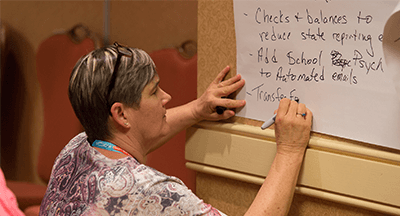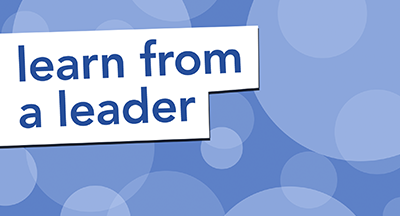How Teachers Empower Kids Through eLearning

|
Erin Werra Blogger, Researcher, and Edvocate |
As time goes on, we’ve grown accustomed to constant change. Teachers are adapting to new online methods of instruction. Educators, kids, and families have been pushed to the limits of patience—and ingenuity. A strong strategy supported by the right tools can help students and teachers adjust to eLearning and find their stride.
What We’re Learning
Above all, we’re learning how unrealistic expectations kill the possibility of meaningful growth. Education leaders are cautioning against the temptation to “do school” at home—attempting to replicate the normal classroom environment in a home setting which is anything but normal.Options for mobile learning have been called into the front lines, including one-way video lectures and other blended learning strategies. Flexibility is key to making progress, and progress is preferable over perfection. Educators are making assignment plans on a weekly, rather than daily, basis. Students then complete their assignments on a schedule that works for them and their families. Siblings and parents may be vying for the same devices all day. Instead of marathons of seat time, educators might set students up for short sprints of engagement punctuated by scheduled one-on-one or class lecture time.
Aside from the health concerns keeping families homebound, danger lurks in online applications as well. Hackers are taking full advantage of new remote learners and workers. Established, approved, and vetted edtech options should always take priority over one-off applications, which can contain vulnerabilities.
Some districts are facing additional challenges around bandwidth. More than ever, it is becoming clear which vendors have prepared for an influx in users, and which ones have not.
Developmental Stages
Educators are in a unique support position for kids during these historic times. As teachers plan lessons, standards and learning are at the forefront of brainstorming—it’s impossible to override that training. However, teachers can empower students at a time when many feel completely powerless. Here’s how.Early Childhood
Social-emotional development at this age can be hard to replicate. Kids are missing the interaction they get with their friends and teachers, and their work is extremely difficult to move online, since students cannot read independently.Movement is important for students at this age, so combining video and activity helps capture their attention for a few precious minutes.
Middle Grades
Desperate to assert their independence, these kids have suddenly found themselves with even fewer options to do so. Project-based learning is great for this developmental group. Allow them to choose an area of expertise and produce something to prove they’ve enriched their expert status. If this expertise is skateboarding, that’s just as valid as calculus or literary classics. The choice and agency afforded is worth it.Teens
While districts in affluent areas are seeing high levels of participation, students in lower income areas may struggle.It’s a catch-22: These students have the most to lose, since they are so close to graduation, but teen students who are called in to active duty as substitute parents have little recourse—especially if their household is one of millions without adequate internet connection.
Weekly assignments can help students feel confident enough to participate when able.
Parents
Schools have always supported parents, and they are leaning on schools even more as they help their children.Especially for younger students, assignments are just as much work for parents. Depending on the household and the district’s capability to provide 1:1 technology, there may be a backlog of available devices. Offering maximum flexibility can be a lifesaver.
The district has a couple choices: they can either pile on work in the name of standards mastery, or they can take an understanding route and remind families progress is what’s important. Either way, good communication is the foundation to build on. Parent portals, like Skyward Family Access, take the email guesswork out of the equation and can deliver a standard message to every family quickly, or provide a secure place for teachers to exchange messages with students and parents.
Maintaining Teachers’ Sanity
Under the best of conditions, teachers are in constant states of improvisation. This training prepared them to respond better than anyone ever would have thought possible. That said, teachers are only human.Encourage them to breathe. To trust themselves (because you trust them, too). To take everything week by week. Minimize and absorb all you can as a school leader, so teachers can in turn minimize the trauma happening to kids.
Teachers are (mostly) all in the same boat across the country. They can lean on their counterparts via social media and learn what works and what doesn’t. Empowerment to try and fail, then try again, is crucial to teachers’ mental health.
Maintaining Administrators’ Sanity
As teachers staff the front lines, administrators remain behind the scenes keeping district operations moving smoothly. Some are working remotely, some visit school buildings or help distribute meals to students. All are depended on (and held mercilessly accountable) by their entire community.It’s a lot to handle.
The best response teams have continued to be visible. They’re making frequent statements, some via video, to keep families informed. Over-communication isn’t possible in this situation, which changes daily.
Gently reinforce healthy work-from-home habits. Any operations which can be managed online will prove lifesaving. Payroll and time tracking with True Time from Skyward, reporting, and other operations remain essential. This is a prime example of how paperless, app-based time and resource tracking can be life-changing. It’s one less thing to set up and manage as schools pivot constantly to provide essential services.
The Bottom Line
Embrace the unexpected, feel it, then let it go. Be gentle with yourself first—the old oxygen mask adage remains valid.This isn’t normal, so you don’t have to pretend it is. We are all in this together, and we can do it.
Follow-Up Resources
Learn how to do more from a distance in this toolkit!Check out Skyward's LMS, the Course Learning Center.
Thinking about edtech for your district? We'd love to help. Visit skyward.com/get-started to learn more.
|
Erin Werra Blogger, Researcher, and Edvocate |
Erin spent sixteen+ years learning, then launched a professional career delving into the inner workings of practice, data, and edtech in K-12 schools. She is always looking to deliver more insights to help you work smarter every day.

 Get started
Get started





